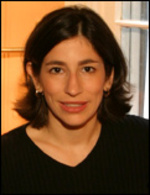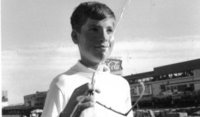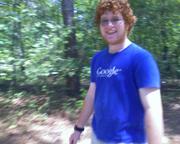One of the more interesting news items to hit our house recently was that MRIs confirm how ADHD impacts brain development.
Areas of the brain which are taught in kindergarten, those involved in social rules and cues, develop slowly. Areas of the brain dealing with higher functions develop normally.
This doesn’t just explain the physiology of ADHD, but may also explain some of our social pathologies toward it. The idea of changing when things are taught is anathema to many people. ADHD kids are taught things they can’t learn, then blamed later for having failed to learn them.
Unfortunately this isn’t how the news was read by readers of Judith Warner (right) in The New York Times. Let kids be kids, and they’ll grow out of it, reared its ugly head, " a nation of boys drugged into conformity by knee-jerk liberal school systems."
Pl-ease!
You can’t "let ADHD kids be kids," in that you can’t just let them run around loose, unmanaged, and expect them to learn anything. You have to find some way to give them structure, to make them sit, before they can learn. And once they do sit, they learn faster than other kids, they hyper-focus and can become better at what interests them. The sooner you can start this process, the sooner strengths can be recognized and rewarded.
In my own case, knowing about my ADHD might have been the best medicine, only I wasn’t given it. Instead, I was sent to a psychiatrist who knew nothing of the condition and an offer of Ritalin was rejected by my mother, who said "you’re not going to put my kid on drugs."
The result was a pretty hellish childhood, at least from the point of view of my own mind, one which I’ve only forgiven my parents for in the last decade, since I learned the cause of my trouble. Instead of being given help I was sent to a Baptist youth camp upstate, which taught Revelations until it came out of my ears, complete with movies. Step out of line and you’ll fry in hell, they said, and here’s what it will look like. Those images still inform my nightmares and leave me more than a little skeptical about churches and God, even though I know such communities can help whether or not you believe the doctrine.
Our answer for my son John is still unfinished. He has gotten all
the help I didn’t get. He has gotten the medicine, special schools,
special camps, and he has chosen a church community for himself. But is
he, even at 16, really that far ahead of where I was? Sometimes I wonder.
It’s made worse by the kinds of jokers who responded to Judith Warners’ Times
blog post. Those who claim a "moral vacuum" are just ADHD’ers who are
using their black-white world view to ignore life’s colors. Calling
proven medical treatments "drug experiments" is pure bias, bias which
can directly impact ADHD kids’ lives, which is how this subject came up.
Ritalin is speed, but it doesn’t act like speed on the minds of people
with ADHD. Those who reflexively refuse medicine for the brain should
be refused treatment when their other organs need it, in my
opinion.
The parts of the brain impacted by ADHD do grow in time, but that’s not the same as growing out of the condition.
My son John has bad habits which annoy me. He has to be reminded
each week to do his chores. One of those chores is emptying the trash
cans. And every week, when he finishes, he forgets to drop the lid on
the outside trash can.
This infuriates me. Every time. It made me mad again this morning.
And he got mad at me in turn. We both have a form of ADHD which
displays with "oppositional disorder," a defensiveness that doesn’t
immediately take delivery of failure, which chooses to deny-and-deny
until (hopefully) we have time to calmly think things through. Of
course, the other side of this disorder is a demand that those who are
wrong give in, and he was wrong in this case. Within 30 seconds of
getting into the car, we were nearly at one anothers’ throats. I dumped
him at his bus stop and drove off in a huff.
It was really nothing. The cause of the fight was nothing. It
escalated because his ADHD symptoms met squarely with my own, and
they’re the same symptoms . It’s one reason I say that pushing ADHD
people together is a bit like trying to line up two magnets. They
resist naturally.
My point is that, no matter how you treat it, ADHD is a lifelong
condition. Our minds don’t develop in isolation, they develop from within society. And our experiences with that society shape our
thinking, even after our brains develop. Bad habits learned in youth,
with an underdeveloped brain, don’t go away by themselves, or even with
discipline alone.
You have to adapt to ADHD. You have to learn what your trips are, as
well as your strengths, and maximize the latter so you’ll have the will
to face the former. Medicine can help, giving young minds the ability
to find success early in life. Medicine can even help later on, if
accompanied by therapy that deals with the underlying issues, and the
kind of self-honesty many without ADHD never have to go through.
But denying the condition, by anyone, at any age, causes real damage. You have my life on that.















I’ve got one word for you on this one.
Amen!
I’ve got one word for you on this one.
Amen!
In my day, before Ritalin, I discovered coffee – black coffee – and cigarettes at the tender age of 15. And used both heavily until forced to quite the smokes in 1968. But – would I have listened to anyone who suggested drugs? Not me, no, sirree, you’re not gonna trank ME into the Twilight Zone, thank you very much.
Hah. Two minutes ago I’d have said “Oppositional defiant disorder? Sweet li’l ol’ me?”
Yup. Horse, meet water.
In my day, before Ritalin, I discovered coffee – black coffee – and cigarettes at the tender age of 15. And used both heavily until forced to quite the smokes in 1968. But – would I have listened to anyone who suggested drugs? Not me, no, sirree, you’re not gonna trank ME into the Twilight Zone, thank you very much.
Hah. Two minutes ago I’d have said “Oppositional defiant disorder? Sweet li’l ol’ me?”
Yup. Horse, meet water.
So true. So very true. My childhood and even early adulthood would have been a gajillion times more manageable if I had some clue why things that were difficult for others came easily and things everyone else mastered simply just would not register for me — no matter how hard I tried.
Getting diagnosed as an adult and getting on Aderall was a life changing event.
So true. So very true. My childhood and even early adulthood would have been a gajillion times more manageable if I had some clue why things that were difficult for others came easily and things everyone else mastered simply just would not register for me — no matter how hard I tried.
Getting diagnosed as an adult and getting on Aderall was a life changing event.
So true. So very true. My childhood and even early adulthood would have been a gajillion times more manageable if I had some clue why things that were difficult for others came easily and things everyone else mastered simply just would not register for me — no matter how hard I tried.
Getting diagnosed as an adult and getting on Aderall was a life changing event.
So true. So very true. My childhood and even early adulthood would have been a gajillion times more manageable if I had some clue why things that were difficult for others came easily and things everyone else mastered simply just would not register for me — no matter how hard I tried.
Getting diagnosed as an adult and getting on Aderall was a life changing event.
An excellent article which I hope many people who have ADHD have read it because it would most probably make their lives better. In recent months, I have come across so many instances of people refusing to admit that ADHD exists! I feel sorry for this group of people because by their sheer ignorance of this medical condition, I can’t see how they can be help.
An excellent article which I hope many people who have ADHD have read it because it would most probably make their lives better. In recent months, I have come across so many instances of people refusing to admit that ADHD exists! I feel sorry for this group of people because by their sheer ignorance of this medical condition, I can’t see how they can be help.
My name is Lance Burnet and i would like to show you my personal experience with Ritalin.
I am 56 years old. I have taken Ritalin for 30 years. I have been diagnosed with a mild form of narcolepsy. I use 4 (10 MG ) pills per day. The drug ahs worked wonders and eliminated the drowsiness and sleep attacks. My concern now is the length of time I have been on it. When taking a “drug holiday” it seems like my symptoms are worse.
I have experienced some of these side effects-
rebound effect when dosage wears off.
I hope this information will be useful to others,
Lance Burnet
My name is Lance Burnet and i would like to show you my personal experience with Ritalin.
I am 56 years old. I have taken Ritalin for 30 years. I have been diagnosed with a mild form of narcolepsy. I use 4 (10 MG ) pills per day. The drug ahs worked wonders and eliminated the drowsiness and sleep attacks. My concern now is the length of time I have been on it. When taking a “drug holiday” it seems like my symptoms are worse.
I have experienced some of these side effects-
rebound effect when dosage wears off.
I hope this information will be useful to others,
Lance Burnet